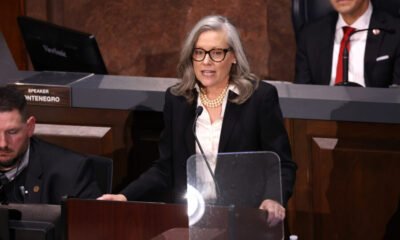cct-tracking
Millions to Receive Boost in Social Security Payments as Biden Approves New Legislation

President Joe Biden is set to sign a significant bill into law on Sunday that will enhance Social Security payments for nearly 3 million current and former public employees. This legislation affects individuals who have served as teachers, firefighters, police officers, and in various public service roles.
Advocates hail the Social Security Fairness Act as a corrective measure to a longstanding inequity, though they acknowledge its potential impact on the already strained Social Security Trust Funds, which face an impending insolvency crisis.
The bill eliminates key provisions—specifically the Windfall Elimination Provision and the Government Pension Offset. These regulations currently limit benefits for those receiving pensions from state or local government public retirement plans.
According to data from the Congressional Research Service, approximately 745,679 individuals, or about 1% of Social Security beneficiaries, have seen their benefits reduced due to the Government Pension Offset. Meanwhile, around 2.1 million beneficiaries, constituting about 3%, have been affected by the Windfall Elimination Provision.
In estimates released by the Congressional Budget Office, reversing the Windfall Elimination Provision could increase monthly payments by an average of $360 by December 2025. Additionally, those affected by the Government Pension Offset might see an increase of about $700 per month, benefiting 380,000 recipients. Surviving spouses are also projected to gain an average of $1,190 in monthly benefits.
These potential increases are likely to rise with regular cost-of-living adjustments in Social Security. The changes take effect from January 2024, which means the Social Security Administration will deliver back-dated payments. However, the process for implementing these adjustments remains unclear.
Edward Kelly, president of the International Association of Fire Fighters, expressed optimism, stating that firefighters nationwide are thrilled to see this long-overdue change. He emphasized that this reform addresses a significant injustice, especially for the surviving spouses of firefighters.
Notably, the International Association of Fire Fighters has around 320,000 members, excluding many retirees who will gain from the new law.
Senator Sherrod Brown, an advocate for the legislation, encouraged support for the proposal despite his recent electoral defeat. Lee Saunders, president of the American Federation of State, County and Municipal Employees, highlighted that over two million public service workers would finally access the Social Security benefits they rightfully earned through their careers.
Supporters, including National Education Association President Becky Pringle, praised the law as a historic win for public service professionals. Critics, however, like Senators John Thune, Rand Paul, and Thom Tillis, argued against the legislation, indicating it could create unsustainable long-term fiscal challenges.
The implications of the new law appear significant, as the Social Security Administration will face increased administrative burdens amid staffing shortages. Currently, the agency employs around 56,645 individuals, the lowest in over 50 years, while servicing a historically high number of beneficiaries.
According to a report released by the Social Security and Medicare trustees, full benefits might not be payable after 2035. Recent changes from the new law could accelerate this insolvency timeline.
Associated Press writer Stephen Groves contributed to this report.


















